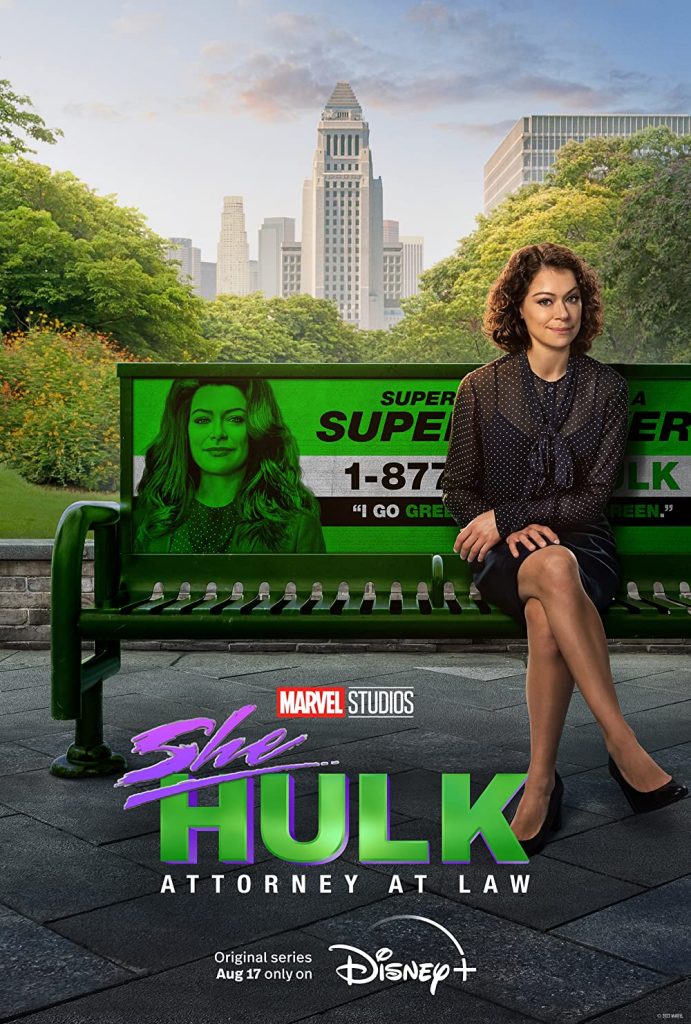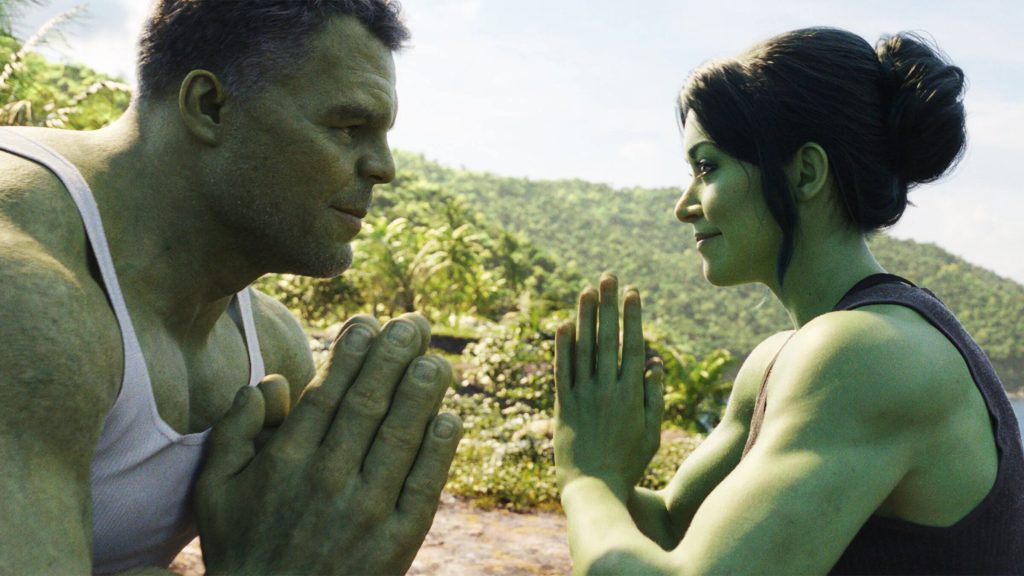I come from a She-Hulk household. From John Byrne’s late 80s and early 90s comic run Sensational She-Hulk, to Marta Acosta’s playful novel, The She-Hulk Diaries, to the more recent comic book storylines, I inherited my mother’s fondness for Bruce Banner’s gamma-radiated cousin. So when Disney announced Marvel’s She-Hulk: Attorney at Law, I was thrilled. Finally, mainstream audiences could relish in the character as I had for most of my life. The series follows high-powered lawyer Jennifer Walters, who becomes the gamma-powered She-Hulk after a life-saving blood transfusion. In her conviction that a court of law delivers more justice than racking up millions in property damage, Walters must balance career and personal life, in addition to unforeseen super-heroics. With a unique premise, a self-conscious satire that participates in and mocks the absurdity of the Marvel Cinematic Universe (MCU) and superhero culture, the show could have delivered a solid addition to Marvel’s streaming content. However, five episodes deep, I am on the fence. The show’s disorienting treatment of character and genre render the show tonally dissonant. Although wildly entertaining, She-Hulk: Attorney at Law leaves fans desperately starving for more, for better or worse.

Rather than the traditional superhero narrative, in which the newly powered protagonist leaps into heroic escapades, She-Hulk explores the reluctant superhero. By framing protagonist Jennifer Walters facing the typical sitcom obstacles observed in shows such as Seinfeld or Ally McBeal, the addition of being a Hulk injects an appealing comedic tension. She reluctantly accepts her identity as She-Hulk, viewing her abilities and public persona as wildcards that disrupt her professional and personal life.
The series’ humour derives from the super-hero formula interrupting the already well-rounded situational comedy character. Walters’s reluctance to participate in absurd super-heroics distances her from traditional archetypes such as Captain Marvel or Thor, allowing a comedic meta-commentary of the superhero genre. These dynamics are enhanced by Tatiana Maslany’s delightful performance as the titular character, who, taking a page from Josh Byrne’s Sensational She-Hulk, shares self-aware and witty observations about the absurdity of her situation with the audience. Although drastically different from other Marvel properties, She-Hulk delivers an original interpretation that both flatters and critiques what came before, appealing to hard-core Marvel fans and casual viewers.
She-Hulk also sets its premise within an overlooked facet of superherodom, enhancing the situational comedy colour of the show. Keeping to the lighter tone of the early comics, the show breaks away from the usual world-ending stakes of the larger MCU to navigate deep-cut Marvel lore for comedic material. As a lawyer specializing in superhuman case law, Walters meets those in the super-powered community who aren’t exactly Avenger-level threats but generate enough nuisance to require unique representation. Consequently, Walters encounters characters that permeate the lower echelons of the Marvel universe, ranging from the mediocre to the ridiculous, in attempts to handle their legal matters; from battling the tool-wielding Wrecking Crew to litigating against Asgardian Light-Elves, and even countersuing lesser-known villain and social media influencer Titania.
The show also draws upon established characters within the MCU, removing them from their usual universe-shattering elements to encounter their own legal circuses. Notable cameos so far include Sorcerer Supreme Wong trying to copyright the Mystic Arts and Emil Blonsky, aka the Abomination, appealing for parole. The show brings in these characters to showcase an otherwise unasked question about the Marvel universe: what mundane problems do superheroes worry about when Thanos or Ultron isn’t planning on conquering the world?

However, for the plethora of things She-Hulk: Attorney at Law gets right, there are a few hurdles which impede the show. The show’s treatment of genre and character is disorienting, confusing the viewer as to the focal point of the show. For any fan of She-Hulk, they are imbued with the knowledge that any comic or book centralizes around the tension between Jennifer Walters and her emerald alter-ego. The popular and powerful She-Hulk persona can sometimes seem preferrable to the mundane life of Jennifer Walters, or Walter’s quiet life seems preferable to She-Hulk’s often destructive and public lifestyle. This conflict creates a slippery slope that eventually leads to the acceptance of both identities. Although the show hints at this conflict, the show’s treatment of dramatic material as a situational comedy rarely leaves time for these dramatic moments. As a result, the few moments that address the clash of identities are played for comedic timing, resulting in the character possessing no clear goal or trajectory. Furthermore, an average episode runtime of twenty-two minutes may allow shows such as Seinfeld or Friends to explore their themes, but for a show that strives to resemble legal dramedies like Ally McBeal, twenty-two minutes is not enough. The limited runtime stifles the story, clumsily alternating comedy and drama at whirlwind speeds, leaving it teetering between quirky legal procedural and tone-deaf mess.
Hopefully, She-Hulk finds the harmony between its conflicting tones to deliver a cohesive legal dramedy. However, fans can still find nuggets of enjoyment throughout the show. Attention to the comics, prominent guest stars, and earnest performances are just enough to forgive the wonky scripts. But if the show’s CGI is an indicator of what’s to come, fans of She-Hulk may be left with a wobbly, rushed, and shallow reminder of what could have been.
